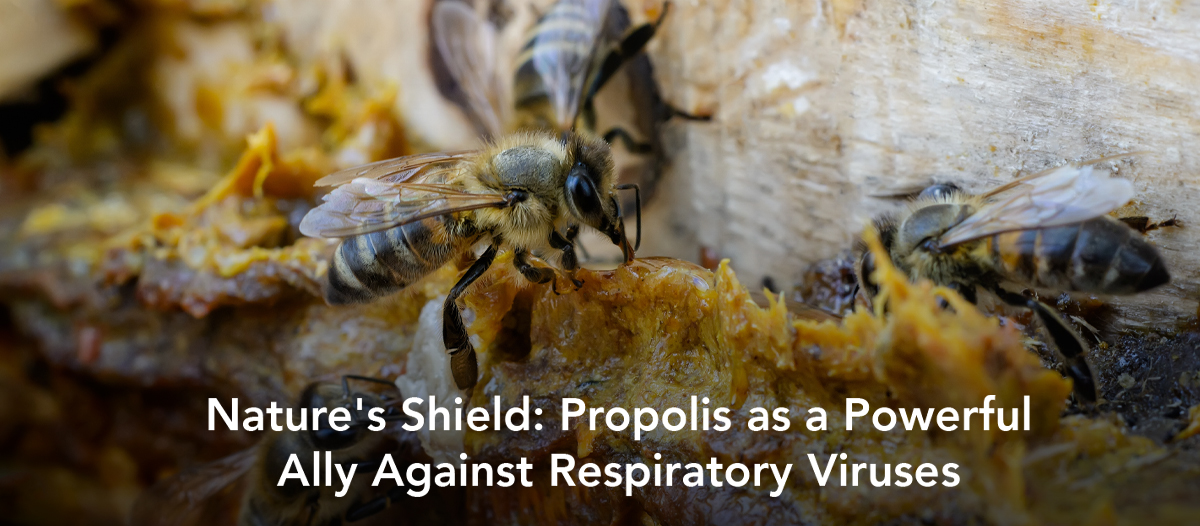Nature’s Shield: Propolis as a Powerful Ally Against Respiratory Viruses
by Mark J Kaylor
In the face of global health challenges, researchers and health enthusiasts alike are turning to nature’s pharmacy for solutions. Among the most promising natural remedies, propolis – often referred to as “bee glue” – has emerged as a potent contender in the fight against respiratory viruses, including the formidable SARS-CoV-2. This resinous substance, meticulously crafted by bees from plant exudates, has been revered for centuries in traditional medicine for its healing properties. Today, modern science is unraveling the complex tapestry of bioactive compounds that make propolis a veritable powerhouse against respiratory ailments. From its broad-spectrum antimicrobial activities to its impressive immunomodulatory effects, propolis is proving to be more than just a simple bee product – it’s a sophisticated natural weapon in our arsenal against viral infections. As we delve into the world of propolis, we’ll explore how this ancient remedy is finding new purpose in addressing contemporary health challenges, offering hope in the ongoing battle against respiratory diseases.
Based on the available research, propolis shows promise as a potential complementary treatment for viral respiratory diseases like COVID-19, though more rigorous clinical trials are still needed. Here are some key points about the effectiveness of propolis:
- Antiviral mechanisms: Propolis has demonstrated several potential mechanisms of action against SARS-CoV-2, including:
– Inhibiting the interaction between the virus’s spike protein and ACE2 receptors
– Decreasing viral replication by reducing RNA transcript synthesis
– Reducing coronavirus particles
- Anti-inflammatory and immunomodulatory effects: Propolis can suppress inflammatory cascades and modulate immune responses, which may help reduce the severity of respiratory symptoms.
- Clinical evidence: Some small clinical trials and case reports have shown promising results:
– A study in Brazil found that propolis solution improved symptoms in a COVID-19 patient after 12 days of treatment.
– Another case in Turkey reported improvement of clinical symptoms after 7 days when propolis was used alongside other treatments.
– A randomized, double-blind, placebo-controlled trial (BeeCovid2) found that standardized Brazilian green propolis extract (EPP-AF®) was associated with a significant decrease in secondary infections in hospitalized COVID-19 patients (6.1% vs 18.9% in the control group).
- Potential for co-infection prevention: Due to its broad-spectrum antimicrobial activities, propolis may help prevent or treat co-infections associated with respiratory diseases like COVID-19.
- Safety profile: Propolis generally has a good safety profile with mild and transient side effects reported in clinical studies.
However, it’s important to note some limitations:
- More research needed: While promising, many of the studies have limitations such as small sample sizes or lack of information about specific virus types[2].
- Variability in composition: The chemical composition of propolis can vary depending on geographic location and plant sources, which can make standardization challenging.
- Not a standalone treatment: Current evidence suggests propolis may be beneficial as a complementary treatment rather than a primary therapy for COVID-19 or other viral respiratory diseases.
In conclusion, while propolis shows potential in treating viral respiratory diseases like COVID-19, particularly in reducing secondary infections and potentially improving symptoms, more large-scale, rigorous clinical trials are needed to fully establish its efficacy and optimal use in treatment protocols.
References:
Berretta, A. A., et al. (2020). Propolis and its potential against SARS-CoV-2 infection mechanisms and COVID-19 disease. Biomedicine & Pharmacotherapy, 131, 110622.
Sforcin, J. M. (2016). Biological properties and therapeutic applications of propolis. Phytotherapy Research, 30(6), 894-905.
Zulhendri, F., et al. (2021). Antiviral activity of propolis and its potential use in COVID-19: A systematic review. Journal of Ethnopharmacology, 278, 114290. [8] https://www.medicalnewstoday.com/articles/propolis
Mark J. Kaylor is a passionate advocate for holistic health and natural remedies, with a focus on extending both lifespan and healthspan. As the founder of the Radiant Health Project and host of Radiant Health Podcast, Mark blends in-depth research with traditional wisdom to empower others on their journey to vibrant health. Through his writing and speaking, he shares insights into the transformative power of herbs, nutrition, and lifestyle practices.
Disclaimer: All information and results stated here is for educational and entertainment purposes only. The information mentioned here is not specific medical advice for any individual and is not intended to be used for self-diagnosis or treatment. This content should not substitute medical advice from a health professional. Always consult your health practitioner regarding any health or medical conditions.




